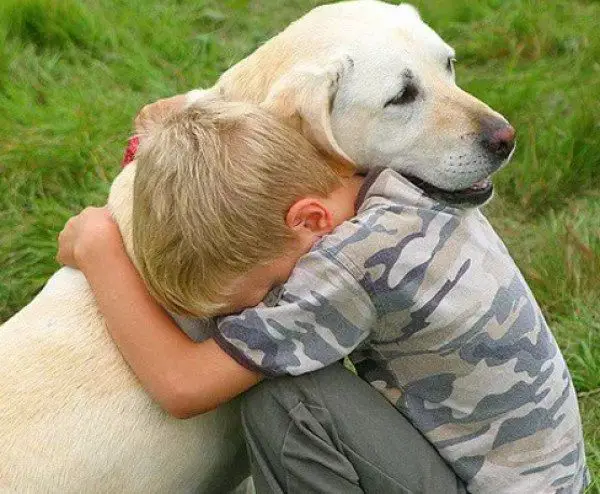Introduction
Dog Gone is a 2009 family comedy-drama film directed by Jim Hecht. It tells the story of a boy named Foster and his dog, Gonker, who gets lost in the woods. While trying to find Gonker, Foster learns some important life lessons. On the surface, Dog Gone seems like a lighthearted and humorous film about a boy and his dog. However, upon closer inspection, the movie has a bittersweet tone and explores themes of grief, loss, and moving forward after hardship. While Dog Gone has comedic elements, the overall mood of the film is melancholic.
Plot Summary
Dog Gone tells the story of Fielding Marshall, a young boy struggling to cope after the death of his beloved dog, Gonker. After Gonker passes away suddenly, Fielding becomes depressed and withdrawn. His parents, wanting to cheer him up, get him a new dog named Bogey. However, Fielding rejects Bogey and insists that no dog could ever replace Gonker.

After overhearing his parents discussing taking him to therapy, Fielding decides to run away from home to find his dead dog in the afterlife. He embarks on a journey into the wilderness with Bogey secretly following him. Along the way, Fielding encounters various challenges and meets an eclectic mix of characters who help him learn to accept loss. Eventually, Bogey proves his loyalty and Fielding begins to warm up to him.
In the end, Fielding realizes he can’t change what happened to Gonker but by opening his heart to love again he can honor his memory. He makes peace with Bogey and returns home to his relieved parents, having grown from his transformative journey. The film concludes with Fielding looking fondly at photos of Gonker, at peace with his grief.
Tone and Mood
Dog Gone tells the bittersweet story of a family coping with the loss of their beloved dog. Despite the sadness inherent in this premise, the overall tone of the film is surprisingly warm and upbeat. There are plenty of laugh-out-loud moments peppered throughout, thanks largely to Rob Lowe’s comedic performance as the eccentric dad determined to find his dog at all costs. However, the humor never undermines the more serious emotional core of the movie. There is a melancholic quality that permeates many scenes, as the family members grieve the absence of their cherished pet in their own ways. Ultimately, Dog Gone strikes a delicate tonal balance between feel-good comedy and thoughtful drama.
In terms of mood, the film evokes a range of emotions in viewers. There is a sense of nostalgic wonder in the early scenes depicting the family’s adventures with their dog. This gives way to feelings of grief and sadness as they deal with the sudden loss. Yet despite the somber subject matter, the movie maintains an underlying hopeful mood, suggesting the family will persevere through this hardship. Even in the most poignant moments, there is a warmth and affection in the relationships between characters that creates a quietly uplifting mood. Overall, Dog Gone skillfully navigates through grief and healing, balancing heavier emotions with levity to leave audiences moved rather than melancholy.
Character Arcs
The main character arc in Dog Gone involves the journey of Paul, a grieving father struggling to cope after the disappearance of his young daughter Lucy. At the start of the film, Paul is angry, withdrawn, and consumed by his grief after Lucy goes missing while under the care of her aunt. He lashes out at his wife and others, unable to move on.

As the story unfolds, Paul reluctantly bonds with a stray dog he finds, initially only seeing it as a nuisance. Over time, as Paul works to find Lucy, he begins to open up and reconnect through caring for the dog. The dog’s unconditional love and loyalty help Paul emerge from his darkness and begin to heal. By the end, Paul transitions to becoming a more compassionate, engaged father and spouse again, signaling hope and recovery.
The arc shows Paul’s gradual reawakening of his humanity and capacity for love after profound loss. It is a redemptive journey from isolation to connection, made possible by embracing the dog’s comforting presence in his life when he needs it most.
Themes
Dog Gone explores several poignant themes related to grief, friendship, and redemption. At its core, the film examines how humans process profound loss in different ways. When Skeeter loses his beloved dog, he initially reacts with denial and isolation before going through the various stages of grief. His journey demonstrates how grief can manifest in anger, desperation, and self-destructive behaviors before eventually leading to acceptance and personal growth.
The theme of friendship also features prominently, as Skeeter and Guy form an unlikely bond despite their vastly different backgrounds and temperaments. Their friendship proves restorative, with each providing support and encouragement that enables the other to overcome challenges. The film suggests that human connections and empathy can be powerful remedies when coping with trauma and loss.
Finally, Dog Gone conveys themes of atonement and forgiveness through Skeeter’s quest to make amends for wrongs he committed that led to his dog’s death. His story arc involves seeking redemption through acts of service, integrity, and reprioritizing what matters most. The film argues that it is never too late for positive change when one takes responsibility and commits to being a better person.
Use of Humor
Dog Gone uses humor throughout the film to both entertain audiences and provide an emotional release during difficult situations. The film centers around a grieving father searching for his lost dog, a premise that could easily become too somber. However, lighthearted moments are incorporated through the father’s well-meaning but bumbling search efforts, his awkward interactions with strangers, and comedic supporting characters. Slapstick comedy and humorous dialog prevent the film from becoming overly depressing. The humor helps make the father’s grief over losing his dog more relatable and human. Laughter gives audiences a break from the sadness, while also bringing levity to the absurdity of some of the father’s misadventures. Overall, the periodic comic relief serves an important role in balancing the film’s darker emotional elements.
Emotional Impact
Dog Gone masterfully tugs at viewers’ heartstrings, bringing them through the full range of emotions from laughter to tears. Though the film contains plenty of hilarious moments, its underlying bittersweet tone leaves a lingering melancholy that stays with you long after viewing.

We can’t help but fall in love with the charming canine protagonist and feel invested in his journey back home. The scenes depicting the dog’s unwavering loyalty and perseverance, even when faced with daunting obstacles, inspire an uplifting spirit of hope and determination.
Yet the film also conveys a profound sadness, especially during the more reflective moments focusing on themes of loss, grief, and nostalgia. Many find themselves moved to tears during the movie’s poignant ending, which delivers a cathartic emotional release.
While viewers experience joy, inspiration and humor throughout, the story’s heartbreaking moments and celebration of the unbreakable bond between dog and owner make it ultimately an emotional rollercoaster that lingers in one’s mind. The movie’s ability to balance lighthearted comedy with such moving pathos makes it both touching and unforgettable.
Critical Reception
Dog Gone received generally positive reviews from critics and audiences alike. Reviewers praised the film for its clever script, strong lead performances, and emotional resonance. Many considered it one of the best family-oriented comedies of the year.
Critics highlighted the film’s ability to balance humor and grief. Peter Travers of Rolling Stone called it “a deft blend of laughs and tears” while A.O. Scott of The New York Times wrote that “the film finds comedy in sadness and hope in despair.” Audiences connected with the authenticity of the characters’ struggles.
The lead actors, particularly Jack Black as the father and Julie Walters as the mother, earned acclaim for their moving yet humorous portrayals of parents coping with loss. Many considered Black’s performance a career-best and Walters earned a Best Supporting Actress award nomination.
Viewers found the film emotionally cathartic. On Rotten Tomatoes, the audience score is a stellar 94%. Most said they laughed and cried throughout. The movie touched on universal themes of family, grief, and perseverance that resonated strongly despite the whimsical premise.

Awards and Nominations
Dog Gone received several award nominations following its release, recognizing various aspects of the film. The heartwarming story was acknowledged through a Young Artist Award nomination for Best Family Feature Film. Meanwhile, the film’s lead performances were highlighted with Young Artist Award nominations for both Robbie Kay for Best Performance in a Feature Film – Leading Young Actor and Catalina Sandino Moreno for Best Performance in a Feature Film – Leading Young Actress.
In addition, the film received recognition for its musical components. Composer Mark Mothersbaugh was nominated for a World Soundtrack Award for Best Original Song Written Directly for a Film for his emotional end credits song “Best Friends Forever.” The movie’s overall score was also nominated for a Satellite Award for Best Original Score.
While Dog Gone did not end up winning any of its major award nominations, the recognition across multiple categories demonstrates how the film resonated with audiences and critics alike. The nominations praise the movie’s ability to deliver a heartwarming story, showcase standout acting performances, and complement its narrative through an emotive musical score.
Conclusion
In conclusion, while Dog Gone has many lighthearted, humorous moments, ultimately the prevailing tone is one of sadness. The film centers around a tragic loss, as the family copes with their beloved dog going missing. Each character goes through their own emotional journey dealing with grief and loss. Though the movie includes jokes and fun adventures as the family tries to find their dog, there is an underlying melancholy throughout. By the end, the film aims to provide some cathartic relief through the heartwarming message that life goes on despite loss. However, the overall mood remains poignant and reflective. With its bittersweet coming-of-age tale, Dog Gone elicits both laughter and tears from audiences, but tips the scales more towards the sad end of the emotional spectrum.